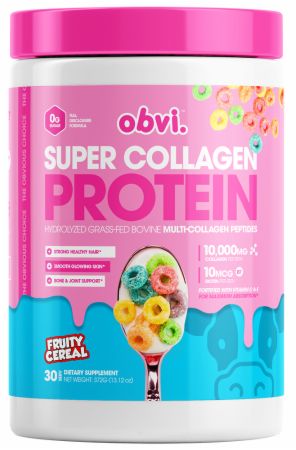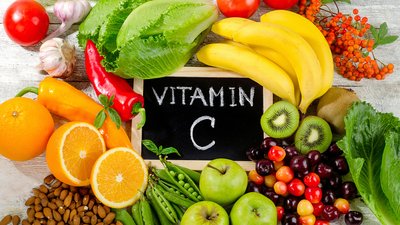Whether it's supporting your immune and circulatory systems or acting as a critical compound in the production of new collagen peptides or neurohormones, vitabodybuilding.com/store/obvi.htmlmin C performs a singular role—it's a giver. It donates an electron to a reaction or to a molecule in need. Technically speaking, vitamin C becomes oxidized and temporarily destabilized into a free-radical form so that other reactions or molecules can be turned on or stabilized.* If cells could tweet, they'd say vitamin C is an incredibly selfless and essential nutrient to have around.
Here are the four most compelling reasons why you need this helping-hand supplement every day:
Reason 1: Vitamin C can't prevent attacks on your immune system, but it does help your body respond and recover better.*
Metabolic reactions, healthy or otherwise, generate byproducts, some of which are called reactive oxygen species, or ROS, and free radicals. Though they're necessary as catalysts for certain adaptive responses, you don't want highly unstable free radicals accumulating if you want to stay healthy.
Under normal circumstances, and with a healthy lifestyle, you can keep these destructive troublemakers under control thanks to the work and adequate availability of support cofactors and antioxidants such as vitamin C. Problems begin when stresses start stimulating the production of more free radicals, including such stress factors as physical injury, obesity, cancer, smoking, strenuous exercise, bacteria, and viruses.

Your frontline attack dogs, called neutrophils, are among the first immune-specific cells to arrive on the scene in response to foreign invaders (e.g., a virus or bacteria), cellular fragments, or inflammatory beacons (cytokines) sent from tissues under assault. Once a neutrophil neutralizes a threat, it's programmed to then self-destruct. This metabolic process creates oxidative byproducts, cellular debris, and more cytokines that, under extreme conditions, can do more harm if your body's antioxidant capacity is depleted.
To reduce cellular damage caused by the overproduction of pro-oxidant free radicals and ROS, vitamin C enters cells and sacrifices a part of itself to stabilize the destructive pro-oxidants.* Paradoxically, vitamin C is converted into a free radical in the process, albeit a relatively stable one.

Reason 2: Vitamin C is critical for healthy tissues, including hair, skin, and nails.*
Without vitamin C, the scaffolding necessary to hold organs together and transport nutrients and information to and from them would be dramatically weakened and, at best, unhealthy.
Organs are made up of tissues, and those tissues are composed of cells. Holding "like" cells together to form tissues and those like tissues together to form organs is an amazing scaffold-like network of fibrous proteins and other components collectively referred to as the extracellular matrix (ECM). If not for the ECM, tissues and organs would lack their mechanical or tensile strength and elasticity.
Additionally, the ECM provides the infrastructure within which the tubing and wiring of the vascular, lymphatic, and nervous systems travel and branch. In other words, it's the matrix that provides a secure and insulated conduit for the exchange of biological information to and about the cells it sustains.
The protein most prevalent within the ECM is collagen. In fact, collagen makes up about 30 percent of all of the proteins in the human body. For example, approximately 90 percent of the ECM of bone is composed of mainly type 1 collagen protein. (There are 28 known collagen types within vertebrates.)
Vitamin C is necessary to activate the amino acids proline and lysine present within the pre-collagen peptides, without which the tightly coiled final structure of collagen wouldn't be possible.* In skin cells that create the ECM, vitamin C stimulates the production of two types of collagen—types 1 and 3.[1]

Reason 3: Vitamin C helps amplify your body's epinephrine and dopamine response.*
Vitamin C influences the response to some of the body's primary chemical messengers—certain neurotransmitters or neurohormones—through both antioxidant and non-antioxidant actions.*
For example, vitamin C increases your sensitivity to certain excitatory stimuli by modifying the cellular receptors involved in sustaining the signal. It also helps prevent the pleasure response neurohormone dopamine from being oxidized into its inactive form. In fact, adequate vitamin C availability has been shown to enhance the effects of stimulants (amphetamines, such as are used for most ADHD medications and many antidepressants) dose-dependently.[2,3]*
Reason 4: Vitamin C is necessary to stimulate nitric oxide, which gives you a pump.*
Your body absolutely needs vitamin C to increase nitric oxide production from the amino acid arginine and elicit increased blood flow for improved recovery and serious pumps. Vitamin C donates one of its electrons and is briefly converted into a free radical within a nitric oxide-generating cycle that occurs at the cellular lining of organs.[4] *
Brief conversion of vitamin C is necessary to continue using arginine to generate nitric oxide, which acts as chemical messenger at the membrane itself, dilating the tissue and increasing the transfer of oxygen- and nutrient-rich blood into cells, where it can remove metabolic waste material.*
*These statements have not been evaluated by the Food and Drug Administration. This product is not intended to diagnose, treat, cure, or prevent any disease.

References
- Du, J., Cullen, J. J., & Buettner, G. R. (2012). Ascorbic acid: chemistry, biology and the treatment of cancer. Biochimica et Biophysica Acta (BBA)-Reviews on Cancer, 1826(2), 443-457.
- Harrison, F.E., & May, J.M. (2009). Vitamin C function in the brain: vital role of the ascorbate transporter SVCT2. Free Radical Biology and Medicine, 46(6), 719-30.
- Ballaz, S.J., & Rebec, G.V. (2019). Neurobiology of vitamin C: expanding the focus from antioxidant to endogenous neuromodulator. Pharmacological Research, 146, 104321.
- Oudemans-van Straaten, H. M., Spoelstra-de Man, A. M., & de Waard, M. C. (2014). Vitamin C revisited. Critical Care, 18(4), 460.


